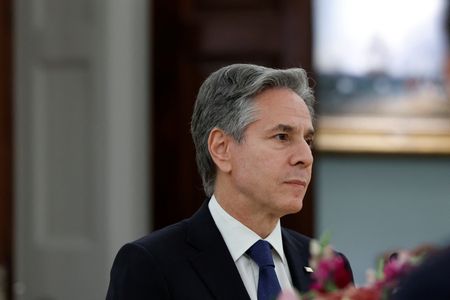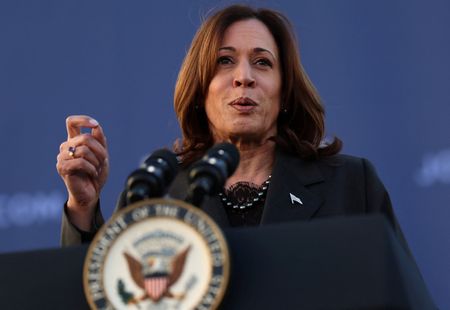By Trevor Hunnicutt and Humeyra Pamuk
WASHINGTON/MUNICH (Reuters) -U.S. Vice President Kamala Harris and Secretary of State Antony Blinken face a tough task at the annual Munich Security Conference that kicks off on Friday – reassuring allies the United States remains committed to defending their security.
Harris and Blinken are set to attend the annual security gathering less than a week after Donald Trump, the frontrunner for the Republican presidential nomination, said he would not defend NATO allies who failed to spend enough on defense from a potential Russia invasion.
In a speech in Munich Friday, Harris plans to pledge the U.S. will never retreat from its NATO obligations put in place after World War Two, and contrast Biden’s approach to global engagement with Trump’s isolationist views, a White House official said.
“The vice president will recommit to defeat the failed ideologies of isolationism, authoritarianism, and unilateralism … (and) denounce these approaches to foreign policy as short-sighted, dangerous, and destabilizing,” a White House official said.
Harris will also “express her confidence that given this stark choice, the American people will continue to support the Biden-Harris administration’s approach,” the official said.
Democratic President Joe Biden is likely to face Trump in November in what looks like a tight rematch of their 2020 contest, at a moment when Trump’s NATO comments have shocked Europe and Trump-supporting Republicans in Congress are blocking aid for Ukraine’s defense against Russia.
Jeremy Shapiro, a research director at the European Council on Foreign Relations, said he did not expect Harris or Blinken to make any promises at the conference about what a prospective Trump administration might do.
“They’re going to give a simple message: We’re going to win the election,” Shapiro predicted.
Harris is scheduled to meet with U.S. lawmakers, Ukrainian President Volodymyr Zelenskiy and German Chancellor Olaf Scholz.
Harris is likely to be closely watched for her ability to lead amid questions over Biden’s age as he runs for a second term. He is 81 and Trump is 77 and both have accused each other of mental decline.
The conference comes as Russia’s invasion of Ukraine has brought war to a continent that has spent decades trying to forge peace, underwritten by U.S. security commitments to the NATO security alliance that Trump has threatened to jettison.
The Senate approved a $95.34 billion military aid package for Ukraine and other countries on Tuesday, but the funding may never be put up for a vote in the Republican-controlled House of Representative because of Trump’s opposition.
Trump made a reference during a political rally on Saturday to what he called “delinquent” payments by NATO members and recounted what he said was a past conversation with the head of “a big country” about a potential attack by Russia.
“No, I would not protect you. In fact I would encourage them (Russia) to do whatever the hell they want. You gotta pay,” Trump said he told the unnamed leader.
The NATO treaty contains a provision that guarantees mutual defense of member states if one is attacked.
Biden condemned Trump’s comments as an invitation for Russian President Vladimir Putin to invade allies and said they underscored the urgent need for Ukraine funding.
Biden took office in 2021 with a promise to revitalize alliances after Trump’s isolationist approach during his 2017-2021 White House tenure and he had largely succeeded — until now, said Rachel Rizzo, senior non-resident fellow at the Atlantic Council.
“But now with the deadlock in Congress, the administration itself is really under pressure to live up to the promises that it’s made to European allies,” Rizzo said. Harris and Blinken have a difficult task of reassuring them, she added.
(Reporting by Trevor Hunnicutt and Humeyra Pamuk; Editing by Heather Timmons, Noeleen Walder, Lincoln Feast, Frances Kerry and Daniel Wallis)






